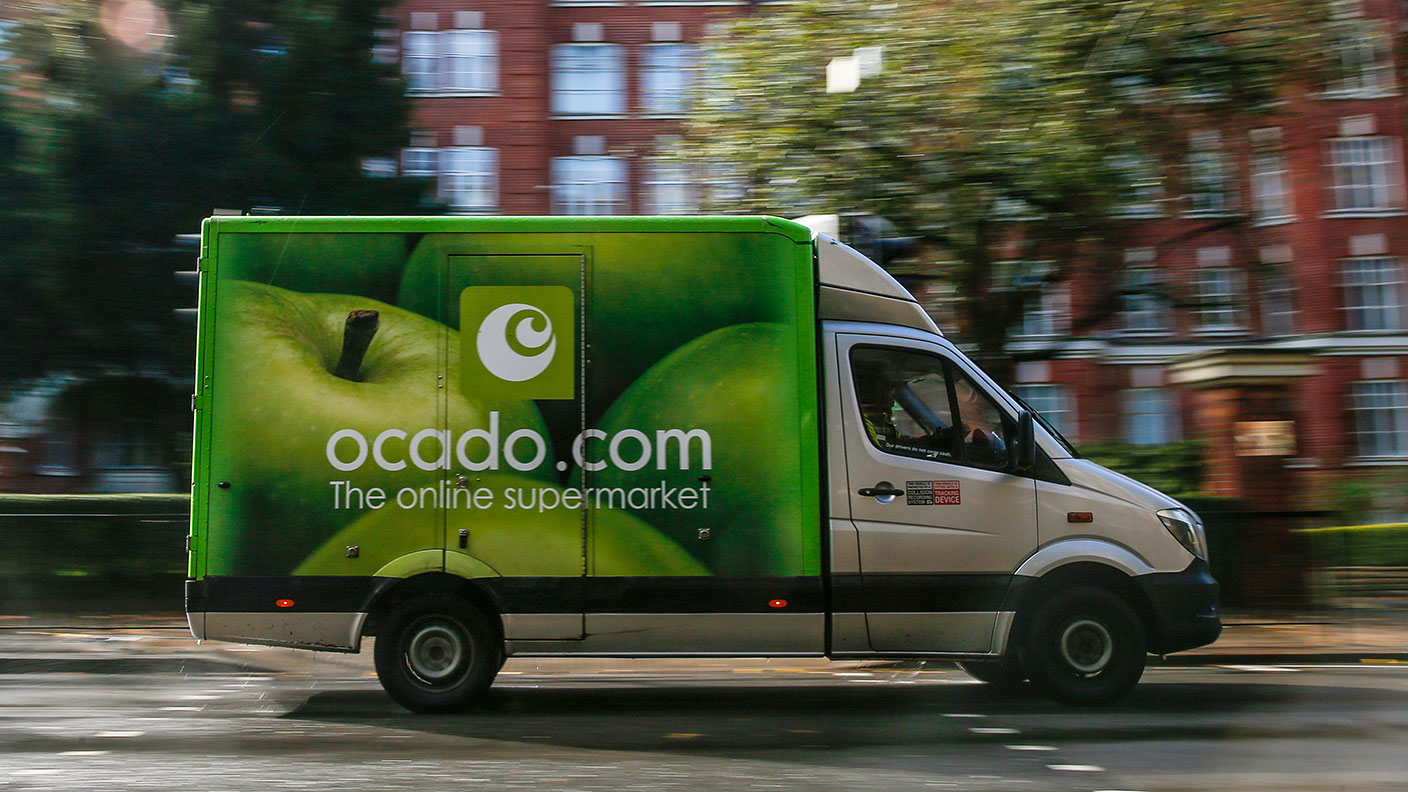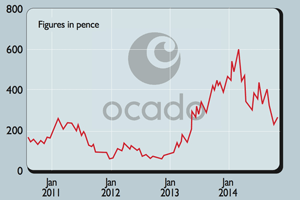Ocado finally takes off
Online grocer Ocado has been a “jam tomorrow” story for years. The jam now finally appears to have arrived. Alice Gråhns reports.
Get the latest financial news, insights and expert analysis from our award-winning MoneyWeek team, to help you understand what really matters when it comes to your finances.
You are now subscribed
Your newsletter sign-up was successful
Want to add more newsletters?

Twice daily
MoneyWeek
Get the latest financial news, insights and expert analysis from our award-winning MoneyWeek team, to help you understand what really matters when it comes to your finances.

Four times a week
Look After My Bills
Sign up to our free money-saving newsletter, filled with the latest news and expert advice to help you find the best tips and deals for managing your bills. Start saving today!

"If Ocado took as long to deliver food to customers as it has for shareholders to see a return, the company would not have lasted five minutes," says Ben Marlow in The Daily Telegraph. Since the online supermarket business floated in the summer of 2010, "a succession of failed promises made it the classic jam tomorrow' story". At one stage analysts thought it could go bust.
But thanks to founder Tim Steiner's perseverance, Ocado "is now flying". His "smartest move" was gradually turning away from the "brutal online grocery market" and transforming the firm into a supplier of top-notch logistics to rival retailers. Ocado's expertise in building automated warehouses for processing and packaging orders has led to tie-ups with supermarket chains such as France's Groupe Casino, Canada's Sobeys and Sweden's ICA Gruppen. Last week came "the most significant" deal yet with US grocery giant Kroger. Its decision to use "British robots" to take on Amazon "is testament to Ocado's incredible achievements".
The deal "is about as good as investors could have hoped for", says Liam Proud on Breakingviews. No wonder the shares jumped by 63% last week. The plan is to build 20 high-tech fulfilment centres in three years the other deals involved just one. Financing all this would be a huge burden for Ocado, but Kroger is to buy a 5% stake, keeping a lid on Ocado's capital-spending burden. Ocado has raised a total £326m of capital, probably enough to build half the warehouses itself.
MoneyWeek
Subscribe to MoneyWeek today and get your first six magazine issues absolutely FREE

Sign up to Money Morning
Don't miss the latest investment and personal finances news, market analysis, plus money-saving tips with our free twice-daily newsletter
Don't miss the latest investment and personal finances news, market analysis, plus money-saving tips with our free twice-daily newsletter
Are investors too optimistic?
Yet is there enough here to justify a 200% increase in the share price in 12 months? Ocado's market capitalisation has jumped to £5.3bn, or £600m more than Marks & Spencer. That would seem to imply a price-to-sales ratio of four, a figure higher than Amazon's, according to Liam Proud. Yet there is scant detail about the deal's financial impact (which Ocado kept under wraps so it wouldn't affect negotiations with other supermarkets). All we really know is that the group's long-term growth rate will now be higher, but assessing anything else requires "a hefty dollop of guesswork".
"Several risks certainly remain," says Matthew Vincent in the Financial Times. We don't know how much capital Ocado will ultimately need to sink into the warehouses, while other details of the deal are still to be hammered out. Ocado's share price is based on estimates of future earnings from licensing its technology that could prove too optimistic. Its exclusivity deal with Kroger also precludes more US partnerships. So given the execution risk, short-sellers, who had borrowed 7% of the stock and got a bloody nose last week, could be back before too long. "To everyone else, though, Ocado now looks a safer bet than ever."
PayPal pays up to hit the shops
"PayPal has long been the king of peer-to-peer payments" and a major player in online payments. Yet it has had "a very limited presence in stores", says Paul Davies in The Wall Street Journal. Its $2.2bn acquisition of fast-growing Swedish payments company iZettle is a sensible way to rectify this. The Swedes' technology is designed for tablets or mobiles, and its light, handy card-readers are often used by small retailers. PayPal is paying a high price for a small operation in "a market that is already fairly crowded but it is the right move strategically, because retailers increasingly want to be able to accept payment in any form".
The deal will place PayPal in direct competition with Square, an American payments processor that has "gained a huge following among small businesses", as well as big point-of-sale terminal providers such as Worldpay.
There had actually been rumours that PayPal was going to acquire Square, a deal that would have cost more than ten times the iZettle takeover, says Alex Webb in Bloomberg. Now PayPal will instead "get ahead in markets where Square has as yet little presence". PayPal serves 19 million merchants globally, primarily in online sales, and derives about 46% of its revenue from outside the US.
The deal is also "a godsend" for iZettle, which is only active in Europe, Brazil and Mexico, and had been planning to go public at a valuation of 10bn Swedish kronor ($1.1bn).
That looked "punchy for an unprofitable business" with revenue of 776m kronor. PayPal, with a market capitalisation topping $90bn, has conveniently come to iZettle's aid. "And it could still make that bid for Square."
City talk
"What's got into the baby milk at Mothercare?" asks Nils Pratley in The Guardian. Last month the board, chaired by Alan Parker, ousted chief executive Mark Newton-Jones and appointed a new CEO. A fortnight later, Parker retired. Now the new chairman, Clive Whiley, has reappointed Newton-Jones. Do the independent non-executive directors who sat through the sacking and reinstatement of Newton-Jones "just do whatever this week's chairman tells them to do"?
"Give people low prices and they'll forgive nearly anything," says Jim Armitage in the Evening Standard. Ryanair proves it: the airline has just reported a 10% leap in profits in the year to the end of March, despite the series of cancellations last September when it messed up its pilots' rostering. Ryanair took €7bn in fares from nearly 10% more passengers. It then warned that it was "on the pessimistic side of cautious" about the outlook before CEO Michael O'Leary admitted that the negativity was "probably unrealistic". Why do investors put up with this "misleading misery"? Like passengers bedazzled by low fares, "they'll forgive O'Leary anything if he keeps delivering the profits".
"What a weird day for the bookies," notes Alistair Osborne in The Times. Who'd have thought the introduction of maximum £2 stakes on fixed-odds betting terminals (FOBTs) last week would result in the shares of William Hill and Ladbrokes Coral-owner GVC both rising by 4%? True, the decision was well trailed, "but the market still looked pretty relaxed if it turns out the bookies weren't actually bluffing". They warned of the closure of 4,000 of the UK's 8,500 betting shops and 21,000 job losses. Yes, but getting hooked on gambling is "more complicated than one product". FOBTs have not raised the overall total of compulsive gamblers "and most play several products".
Get the latest financial news, insights and expert analysis from our award-winning MoneyWeek team, to help you understand what really matters when it comes to your finances.
Alice grew up in Stockholm and studied at the University of the Arts London, where she gained a first-class BA in Journalism. She has written for several publications in Stockholm and London, and joined MoneyWeek in 2017.
Alice is now Consumer Editor at The Sun and covers everything from energy bills to Social Security.
-
 Should you buy an active ETF?
Should you buy an active ETF?ETFs are often mischaracterised as passive products, but they can be a convenient way to add active management to your portfolio
-
 Power up your pension before 5 April – easy ways to save before the tax year end
Power up your pension before 5 April – easy ways to save before the tax year endWith the end of the tax year looming, pension savers currently have a window to review and maximise what’s going into their retirement funds – we look at how
-
 As Ocado’s troubles mount, it’s time to sell
As Ocado’s troubles mount, it’s time to sellTips Online retailer Ocado has struggled to build value for shareholders, and still isn't turning a profit. If you hold Ocado shares, now might be a good time to sell, says Rupert Hargreaves.
-
 Ocado’s surge shows what happens when a hated asset springs a surprise
Ocado’s surge shows what happens when a hated asset springs a surpriseFeatures Shares in online grocer Ocado – hated by investors – suddenly spiked. It shows what can happen when sentiment turns, and holds a lesson for the broader UK market.
-
Ocado finally delivers a profit
News Online supermarket Ocado has finally delivered its first annual profit after 15 years.
-
 Shares in focus: Will Ocado ever make money?
Shares in focus: Will Ocado ever make money?Features Ocado's shares are pricey, but the online supermarket has promise. Should you buy in? Phil Oakley investigates.
-
 Ocado IPO: Don't touch it with a bargepole
Ocado IPO: Don't touch it with a bargepoleFeatures Ocado's flotation is like something out of the dotcom boom: an over-valued, loss making company in a desperate call for cash. But it's a great lesson in what to look out for in new issues, say Bengt Saelensminde.